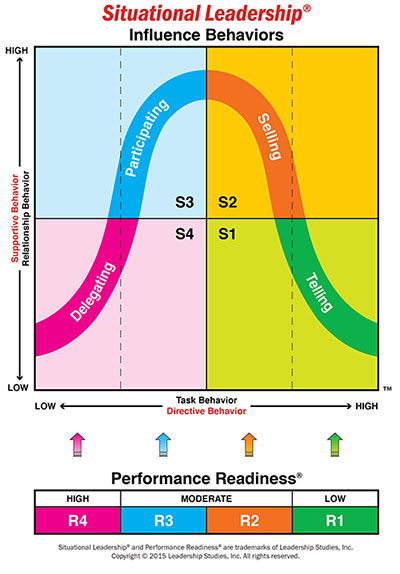
Leadership is not just about strategies and execution – it's about inspiring and motivating yourself and others to achieve ambitious goals.
As we enter 2025, there’s a greater need to keep pace with technological advances, but mastering the art of human connection cannot be overlooked. Effective leadership hinges on the ability to inspire, motivate and connect with others in today’s fast-evolving workplace.
At GBS Corporate Training, we’ve been delivering innovative Leadership and Management learning solutions for over 50 years, helping leaders, managers, and teams drive real behavioural change in an ever-evolving business landscape. As the UK Affiliate for Situational Leadership®, we provide globally renowned training designed to equip leaders with the skills they need to thrive. Whether you want to sharpen your communication, manage change effectively, or master conflict resolution, our training empowers you to deliver continuous improvement. So, what are the essential skills that define an effective leader?
Let’s explore the qualities every leader needs to succeed in a world of rapid change and complex demands.
Confidence
Confidence is a critical trait for leaders, empowering them to take risks, achieve strategic objectives and navigate crises with a steady hand. When leaders genuinely believe in their abilities, they can inspire and motivate their teams, fostering an environment where bold decisions and calm leadership prevail. However, the benefits of confidence must be tempered with caution. A study highlighted by Forbes reveals the potential pitfalls of excessive self-confidence, which can lead to several negative outcomes:
Lack of Trust: Overconfidence can erode trust within a team. When leaders appear too certain, team members may feel their input is undervalued, leading to disengagement.
Arrogance: High self-assurance can sometimes cross into arrogance, making leaders resistant to feedback and averse to personal change. This resistance can stifle growth and innovation.
Damaged Relationships: Overconfident leaders may neglect the feelings and contributions of others, leading to strained relationships. Team members might feel exploited, decreasing morale and cooperation.
Compromised Integrity: Excessive confidence can cause leaders to overcommit, fail to honour promises and undermine their role as trustworthy role models.Therefore, effective leadership involves a delicate balance: being confident enough to lead decisively while remaining humble and open to feedback. By embracing both confidence and humility, leaders can cultivate trust, encourage collaboration and maintain integrity, ultimately enhancing their effectiveness and the cohesion of their teams. This aligns closely with the core teachings of Situational Leadership®, which emphasises the importance of adapting your leadership style to meet the unique needs of your team and the challenges they face. By developing the self-awareness to balance confidence with flexibility, leaders can inspire trust, encourage collaboration and achieve lasting success.
 Adapting to the Situation
Adapting to the Situation
Hersey and Blanchard outlined four leadership styles that can be applied depending on the situation.
Style 1 - Telling
Style 2 - Selling
Style 3 - Participating
Style 4 - Delegating
Communication
Effective communication will always be pivotal to leadership. It's not just about clearly conveying information but also about listening, adapting your message when necessary and demonstrating understanding. Great leaders communicate their vision compellingly and clearly, fostering an environment where every voice feels heard.
Interpersonal Skills
To connect with their team members on a personal level, you need interpersonal skills. A Gartner, Inc. survey found that 90% of HR leaders surveyed believe that to succeed in today’s work environment, leaders must focus on the human aspects of leadership. While “traditional” leadership skills like strategic planning and business analytics are still crucial, the most effective leaders also rely on their interpersonal skills to inspire others and drive meaningful results.
Emotional Intelligence
Leaders who possess this quality can effectively perceive, evaluate, and respond to their own emotions and those of others. It’s invaluable in creating a supportive team environment, ensuring high morale and making team members feel valued and understood.
To help leaders harness the power of Emotional Intelligence, we offer a one-day workshop designed to motivate and engage teams, strengthen cooperation, and drive higher levels of performance. This workshop introduces the concepts of Emotional Intelligence (EI) and Emotional Quotient (EQ), providing an in-depth understanding of the impact emotions have on thoughts and actions.
Creativity
Creativity can be challenging for some leaders to cultivate within their teams. As the late Edward de Bono once stated, 'Creativity involves breaking out of established patterns to look at things differently.' In the face of challenges, creativity becomes a leader’s most potent tool, allowing for innovative solutions that defy traditional boundaries and spark progress. Leaders who foster a culture of innovation encourage their teams to explore new ideas, propelling the organisation forward.
Decision-Making
Effective decision-making involves analysing information, anticipating outcomes and making informed choices promptly. A leader's ability to make clear, strategic decisions can greatly impact the success of their team and organisation.
Dealing with Conflict
Conflict is inevitable in any dynamic business environment. However, it's not merely an obstacle; it presents opportunities. By understanding the roots of conflict and addressing them constructively, leaders ensure that the team remains focused and united, turning potential disruptions into drivers of cohesion and progress.
Ultimately, the journey to becoming a great leader is continuous. It demands dedication to developing confidence, communication, interpersonal abilities, emotional intelligence, creativity, decision-making prowess and effective conflict-resolution techniques.
How Can We Help You?
Our globally recognised Situational Leadership® training is adaptable to any circumstance, preparing you to address the most pressing challenges in today’s work environment while driving success for your organisation.
You can learn more about our Situational Leadership® Training Accreditation Programmes here, but for any further information or advice, please contact our friendly training experts on 01252 618 400 or email theteam@gbscorporate.com.
Situational Leadership® and Performance Readiness® are registered trademarks of Leadership Studies, Inc. dba The Center for Leadership Studies. Copyright ©2015, Leadership Studies, Inc. All Rights Reserved.






